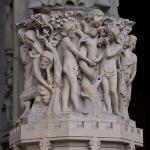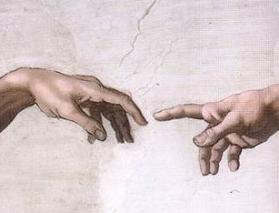
There are at least two competing ideologies in our world today—the survival of the fittest expressed in strict, even violent competition, and the survival of the friendliest. Both make their appearance in evolutionary theory, the Netflix sensation, Squid Game, and in the Christian life.
We are perhaps more aware of the survival of the fittest doctrine, which is often associated with Charles Darwin’s Origins of the Species. In fact, the term makes its appearance in Origins’ 5th edition. To be precise, Darwin actually favored “survival of the fitter” since a species’ struggle for its own existence is not fixed, but relative to its circumstances in a given ecosystem. It is also worth noting that according to John Hedley Brooke, Darwin argued that it is important to reflect upon cooperative predispositions or tendencies in addition to natural selection.[1] I guess one could say that evolution is not simply about a dog eat dog or ape beat ape view of reality.
With this point in mind, consider Brian Hare and Vanessa Woods’ work, Survival of the Friendliest.[2] A mental leap involving friendliness or cooperation supplied Homo sapiens with the cognitive tools to thrive. Hare and Woods call this process the “self-domestication theory.” However, even good things can come to a bad end. Our biological circuits can easily get tangled in a knot and lead us to go awry. The lesser angels of our human nature can move toward the pursuit of domination over those we deem threatening outsiders.
That said, other recent studies have also claimed that cooperation or collaboration and creativity describe human flourishing better than strict competition between individual members and their tribes. Agustín Fuentes argues that in contrast to those narratives featuring the will to survive and reproduce, new studies in anthropology, paleontology, biology, and other spheres have claimed that the distinctive trait of humanity is our capacity for imaginative cooperation.[3]
Squid Game is about hundreds of debt-ridden people agreeing to play a series of games in the hope of gaining financial liberation. They soon find out that the games they are playing put all of them in mortal danger. If they lose, they die. Faced with the threat of extinction, players team up to try and survive the physically and psychologically grueling ordeal.
Strict competition vs. creative cooperation manifests itself in nearly, if not every, area of life. The same can be said for Christian existence. 1 Corinthians 1 reflects upon the disunity in the church of Corinth, where the believers aligned themselves with leading figures and personalities in the hopes of proving their superiority over others in Christ’s body.
Paul would have none of this way of thinking and living in the church. Rather, for Paul, God honors the weak and foolish, namely Jesus, who demonstrates God’s power and wisdom on the cross. Those who boast should glory in Jesus, not in themselves or their preferred Christian leader or super apostle (See 1 Corinthians 1). As my pastor friend Tom Schiave argues, we must descend into greatness. Such greatness never comes at the expense of others, but in creative cooperation with them.
What we see in Jesus is what we get with God. Further to what Nicholas of Cusa and Jonathan Edwards argue, God’s trinitarian being involves mutuality, which is necessary and foundational for divine, unconditional love, which undergirds and overflows in the world.[4] We in turn image that love when we love our neighbors as ourselves.
Further to 1 Corinthians 1, we find in Philippians 2 a profound emphasis on God’s downward mobility and creative cooperation, which in turn fosters the same kind of creative dynamic in Jesus’ people. Just as Jesus was secure in his Father’s embrace and did not have to grasp for his deity, so those who are encouraged by being united with Christ, comforted by his love, and secure in the fellowship of the Spirit consider others better than themselves.
Paul, Timothy, and Epaphroditus, all noted in Philippians chapter 2, follow suit. Such mutuality and downward mobility involving the Father, Son, and Spirit provide the secure attachment we need to move beyond strict competition to imaginative cooperation and collaboration in the church and society at large.
A line from Squid Game reads, “You don’t trust people because they are trustworthy. You do it because you have nothing else to rely on.” In contrast, we trust the God revealed fully in Jesus because he alone is worthy of our total trust and leads us to move from strict competition involving the survival of the fittest to friendly cooperation and creative collaboration.
_______________
[1]See John Hedley Brooke, “‘Ready to Aid One Another’: Darwin on Nature, God, and Cooperation,” in Evolution, Games, and God: The Principle of Cooperation, ed. Martin A. Nowak and Sarah Coakley (Cambridge, MA: Harvard University Press, 2013), 37-59.
[2]Brian Hare and Vanessa Woods, Survival of the Friendliest: Understanding Our Origins and Rediscovering Our Common Humanity (New York: Penguin: 2020).
[3]Agustín Fuentes, The Creative Spark: How Imagination Made Humans Exceptional (New York: Random House, 2017).
[4]For Nicholas, the doctrine of the Trinity is necessary for the reality of divine love existing apart from the world. See Nicholas of Cusa, “Cribratio Alkorani,” in Nicholas of Cusa’s De pace fidei and Cribratio Alkorani, trans. Jasper Hopkins (Minneapolis: Banning, 1994), 108. Jonathan Edwards, The Nature of True Virtue, in Ethical Writings, ed. Paul Ramsey, The Works of Jonathan Edwards, vol. 8 (New Haven, CT: Yale University Press, 1989), 557.

















